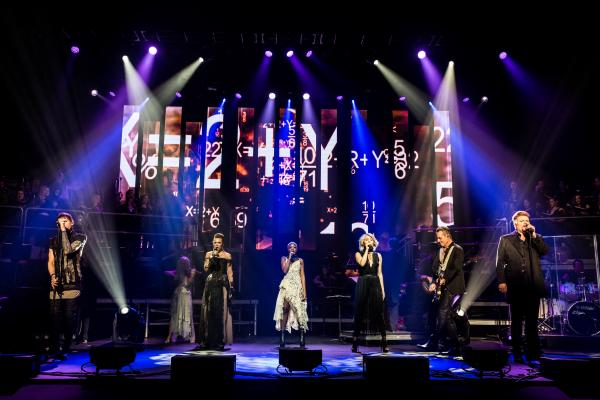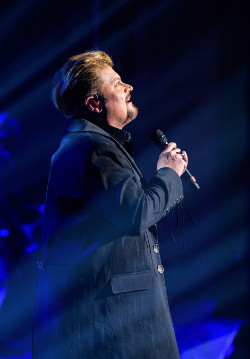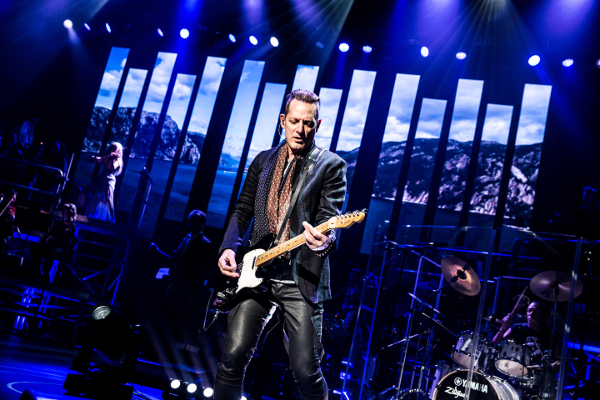Also Sprach Rocktopia: Backstage With Broadway’s Inspiring Hybrid Rock/Classical Musical

You say you want a musical (r)evolution? Well, you know, look no further than what’s being done with Rocktopia, the quite inspiring, electrifying hybrid rock-meets-classical musical that recently completed a triumphant six-week run on Broadway, with a tour currently in the midst of being planned for the fall.
Rocktopia is the brainchild of veteran Broadway vocal powerhouse Rob Evan (Jekyll & Hyde, Les Misérables, Trans-Siberian Orchestra), musical director/guitarist Tony Bruno (Enrique Iglesias, Rihanna, America’s Got Talent), and Maestro Randall Craig Fleischer (Boston Pops, China Philharmonic, Los Angeles Philharmonic). “The whole idea of this show is to take you on a journey through the human condition,” Evan explains. “That whole first movement — with [Strauss’] Also Sprach Zarathustra going into The Who’s ‘Baba O’Riley’ into [Mozart’s] Eine Kleine Nachtmusik into Styx’s ‘Come Sail Away’ — is just the invitation to come on this journey with us.”
(BTW, if you can’t wait for the upcoming tour to share in this amazing journey, you can check out Rocktopia now on both CD and DVD via Rocktopia: A Classical (R)evolution – Live in Concert From Budapest.)
In addition to the Rocktopia cast’s own stunning vocalist repertory, the Broadway run also featured a rotation of three fabulous rock singers: Pat Monahan of Train, Dee Snider of Twisted Sister, and Robin Zander of Cheap Trick. “I love Broadway, and I love the concert–theater experience,” says Snider — no stranger to the Great White Way himself, having spent time out on the planks singing in Rock of Ages. “The beauty of Rocktopia is that all of this music is in the same room, and at the same table. All of this music is equally grand in its own way, and it needs to be appreciated and respected. You have symphonic pieces with a classical orchestra performing them, operatic pieces with an opera singer, rock pieces with a rock singer, and they’re mashing it all together. As Rob says early on in the show, ‘This is a party,’ and everybody is here is celebrating in the same room — and that’s cool. I’m happy to enjoy this party, and I’m honored to be a part of it.” (In other words: We are gonna take it, thank you very much.)
After jawing with Snider out in the orchestra seats, I then went backstage up a few levels to a shared dressing room and sat down with both Evan and Bruno about an hour before showtime to discuss the clever ways they fuse the worlds of classical and rock music together, and where the show may be headed next. Carry on, carry on, as if nothing really matters. . .
 Mike Mettler: I love the fact that Rocktopia brings such varied worlds of music together. When you get right down to it, that’s part of the overall goal here, isn’t it?
Mike Mettler: I love the fact that Rocktopia brings such varied worlds of music together. When you get right down to it, that’s part of the overall goal here, isn’t it?
Rob Evan: That’s the whole goal! It’s really all about the music. Yes, we had to add all these trappings to the show, but then we just found organically there are a lot of layers to this thing we haven’t even been able to fully reveal yet.
To me, this is the kind of project that can go on and on. And it’s not even language-specific, so it can be done internationally too. This brand is still very much “new,” and we’ve got grand ambitions for it. When people say, “Hasn’t this all been done before?” — well, it’s never quite been done before like this. I know, because I’m familiar with all these other universes you’re talking about, so musically speaking, it’s never quite been done like this. That said, I think we can still work on it, perfect it, and make it even more authentic.
Mettler: Putting together rock and orchestral music and arranging it for the stage — there had to be a lot of ramp-up work for you in terms of things like, “What’s the volume level for X?” and “How do I fit a guitar into the mix of Y when the strings do this?” How detailed did you have to get?
Evan: It’s very detailed. I do a little bit of everything including the marketing, but he [points to Tony] — he’s the General. I mean, every day, Tony is working on something new. It’s a nonstop thing for him. Tony is an integral part of this show, and its long-term vision. He arranges everything for us.
Mettler: Is there one of the rock songs that you had to arrange differently, in terms of working with different vocalists, to get it to a point where you were comfortable with the sound and the arrangement?
Evan: [to Tony] Talk about [Led Zeppelin’s] “Kashmir.”
Tony Bruno: “Kashmir” is a good example, yeah. It changed quite a bit. The version we have is pretty sparse at the beginning — mostly just a haunting piano, and then the strings work their way in. Dee wanted to sing it pretty intensely. He’s not a spoken-word guy, but that’s how Pat [Monahan] did it.
Evan: This version of “Kashmir” was originally done for the singer we worked with in Budapest. I tried to create a lot of it around her strengths as a vocalist — and, really, that’s what I do for all of the artists we have. But I also did it so they could stand on their own, because the idea is this project is bigger than all of us. That was always my idea for it. Always.
I was also trying to create something that would showcase the duality of my voice. I was trained as an opera singer, but I always just wanted to be a rock star. (smiles) That was something Paul O’Neill [the creator of Trans-Siberian Orchestra who passed away in 2017] found when we first met in 2000. That said, I wanted something haunting and deconstructed, and that’s what we did with “Kashmir.” And like everything we’ve done in the show since we first started in 2016, it’s evolved.
Mettler: I like that, because this show is essentially a living entity.
Evan: (nods) It really is a living entity. Last night, I told Dee I felt like we embraced each other as a family for the first time. It’s just like trial by fire. Pat jumped in with one rehearsal, and Dee jumped in with one rehearsal. At first, the adrenaline is so high, and then you go, “Ohhhh. . . I get what this is!” We can all breathe together, and have our own voice in this project.
Bruno: It’s tough because, in the beginning, you want to go all guns blazing — but you can’t really do it on this show, because you have to pace yourself with the music.
Mettler: I look at it as a “sine wave” kind of show, because it has a consistent level of peaks and valleys to it in the way you take people through the history of music.
Evan: It is! I love that you see it that way. That was a big point for me, in that I wanted every person to have their own takeaway. I didn’t want to tell you a “story.” But if you connected with something — that great. It’s funny, because all of the industry people I talk to have their own favorites, and it’s all different. (chuckles)
Bruno: And that’s a great thing. [looks at Rob] We’ve talked about this before, where the audience reaction is in different spots. There are some key spots where it’s always big, but during the bulk of the show, there are different spots that hit home. And that’s great too, because then we can go, “OK, this one works better than that one, so maybe we write more like these.”
Evan: And that’s why it’s probably so exhausting for us, because it’s so authentic every night. You can’t phone this show in. You (takes slight pauses per word) Cannot. Phone. This. Show in. (chuckles)

Mettler: Well, we don’t want that at all. And even if the audience doesn’t know about the level of detail in the way you deconstruct, rearrange, and rework how things composed centuries ago logically tie into modern music, you’re still introducing them to the whole history of the artform.
Evan: That’s a real interesting point, because the third creative force behind this show is a guy named Randall [Craig] Fleischer. When Randy and I first connected, we found we both had these loves of classical and rock. He was more steeped in the classical world, and I had more knowledge in the rock world. Randy does a lot of subtle stuff you maybe wouldn’t realize unless you’re familiar with some of these compositions. We get criticized sometimes for “just” doing a cover — but we’re never just doing a cover. Nothing is purely streamlined; there’s always something happening.
Mettler: I think that’s just lazy listening. For example, there are quite a few layers to the way you take on Foreigner’s “I Want to Know What Love Is,” including one key opera element.
Evan: Ah, nice — so you can hear the Quando m’en vo’! It’s there! (laughs heartily) Originally it was there vocally, where Alyson [Cambridge], the opera singer, and I were singing the Quando m’en vo’, but we just felt like it stepped on Chloe [Lowery’s] amazing lead vocals. Instead, we let the horns have it. And either you get it or you don’t, but I’m fine either way.
[Quando m’en vo’, also known as “Musetta’s Waltz,” is a soprano aria in 3/4 waltz time, and it comes from Act 2 of Puccini’s legendary opera, La bohème.]
Bruno: It’s an interesting point you’ve both talked about. You have to find the line where you might be expecting too much from your audience. They can’t be expected to listen to too much music — they just need to take it in, and not have us oversell them on, “Hey, check out this part that’s happening in the back.” You can overdo it, is what I’m saying.
Evan: There is so much sonic space that we can carve out with these arrangements. We did have a hard time trying to do this show on tour as one-nighters — to both carve out the space for the real rock, but also be able to feel the dynamics of the show to honor the classical compositions. That’s always going to be a challenge.
Bruno: Yeah. This is the first time we’ve done a residency like this, and we’ve finally gotten the mix to where I want it to be. Everyone who’s seen the show more than once has come up to me and said, “What did you guys do? It sounds incredible.”
Mettler: I can’t imagine Rocktopia not continuing after this run.
Bruno: I can’t either.
Mettler: I think, like Rob said, it could go many places after this. Can we say when/where that might be?
Evan: Oh yeah, we’ve got a fall tour we’re working on. I’d love to see it play in cities like London and Toronto. And I’d love to do this in Asia too, because I’ve worked in Asia before, and I think they would embrace this. And then I would like to come back to Broadway every year, as a tradition. It IS a residency, that’s exactly what it is. This is a really high-level tour stop for us.
Mettler: Having said that, do you feel you’ll be asked back for a residency here at the Broadway Theatre?
Evan: I’d like to. I think we have to create our own opportunities with what we’re doing.
Bruno: It feels that way. It’s more of a word-of-mouth thing right now. We seem to attract the people who don’t really go to Broadway, but they want to see musical theater.
Evan: We all have histories with these songs. We all have our private, emotional histories with them. And that’s a gift for us to have in our lives — even if it’s just a passing, fleeting moment to go back to that time in our youth and go, “Wow, that was amazing.” It’s a great escape.
Bruno: We’ve come so full circle in the music. But what music in the last five years will we be thinking about 40 or 50 years from now? It’s tough to quantify.
Evan: Well, you know, it’s always inspiration for us when we walk out there and we hear somebody like you, who knows music so well, go, “Guys, it’s cool.”
Mettler: I’m glad to do that for you, because I also see how Rocktopia connects with the volume of people you’re seeing out there night after night, so please keep doing it! Last thing: You already know how much I like the live Budapest DVD, so when do we get the full-on surround sound Blu-ray version of the entire Broadway show?
Evan: Ah, well. . . (slight pause) I’ll just have to go raise some more money so we can do that! (all laugh)


























































